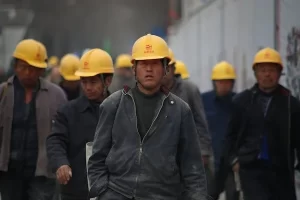Oil workers understand the importance of health and safety regulations on the job. It is essential that these workers take the necessary steps to ensure their safety while performing their duties. The health and safety of an oil worker is paramount, as any mishap could cause harm to not only the worker, but to the environment, and to people living within the vicinity of the production site.

Oil and gas production is highly hazardous due to the presence of heavy machinery, the flammable and explosive nature of its products, and the fact that its sites are often in remote locations with varying levels of regulation. As a result, oil workers must take extra precautions to ensure their safety every day. Safety is a complex and ongoing process that necessitates a comprehensive awareness and diligent compliance of regulations by all personnel working in the oil and gas industry.
By continuously monitoring the workforce and ensuring safe working conditions, oil workers secure their well-being, and the safety of those around them. They also protect their job security by minimizing the risk of injury while performing their job.
Safety precautions such a proper PPE, adherence to governmental and occupational safety regulations, periodic inspections, security checks, and emergency response plans are paramount to ensure workers’ safety and protect them from any dangers that may arise on the job. Furthermore, installing advanced safety technologies and equipment in the workplace can help identify potential hazards before a dangerous incident occurs.
Oil workers take utmost care to prioritize their health by ensuring their adherence to the available safety regulations. Many oil and gas production and distribution sites have stringent safety regulations and intense inspection processes, with severe consequences for noncompliance. In addition, oil workers are regularly trained onsite health and safety topics, from slips and falls to hazardous material handling and disposal. Rig operators, for instance, must become proficient in proper emergency protocols and incident response planning in order to protect themselves and their crew.
Furthermore, it is important for workers in the offshore oil and gas industry to be aware of the psychological safety risks associated with elongated periods away from home. This is especially true for offshore workers who must remain onsite for several days. If left unchecked, overworking and isolation have been known to take a toll on the mental and physical health of oil workers.
Various companies are taking necessary steps to ensure that workers are as safe as possible while carrying out their tasks. They directly address the need for an enhanced safety awareness among their employees and install the necessary equipment to ensure their security. Companies understand that their safety-conscious workforce is essential in securing their workers’ safety.
In conclusion, oil workers value their health safety above all and take the necessary precautions to ensure it. Oils workers understand the importance of diligently adhering to safety regulations, inspections, and training. Companies, too, recognize the need for a safe and secure work environment and take the steps necessary to implement safety policies and procedures. Regularly monitoring workers and addressing psychological safety risks are essential in keeping workers safe and healthy. Taking the necessary steps now will keep our oil workers safe and healthy in the future.